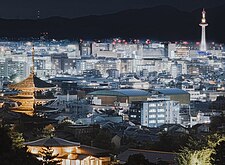Gekoree
This article is incomplete because it is pending further input from participants, or it is a work-in-progress by one author. Please comment on this article's talk page to share your input, comments and questions. Note: To contribute to this article, you may need to seek help from the author(s) of this page. |
Gekoree
げこれえ市 | |
|---|---|
Royal Capital city | |
| Gekoree City | |
 Clockwise from top left: Gekoree Imperial Palace, Saki-Fumetsu Gate, Gekoree Tower, Fenikkusu no Su District and Nemutte iru Fenikkusu Shrine. | |
| Nickname(s): フェニックスの巣 (The Phoenix's Nest) 南のゆりかご (The Southern Cradle) | |
| Motto(s): "伝統を守り続ける" "Keeping The Tradition Alive" | |
 | |
| Country | |
| Region | Fūtaba |
| Administrative Division | The Three Exclusives |
| Founded | 269 BC |
| Government | |
| • Type | Mayor–council |
| • Body | Gekoree City Assembly |
| • Mayor | Tsuji Kadokawa |
| Area | |
| • Total | 1,789.23 km2 (690.83 sq mi) |
| Highest elevation | 954 m (3,130 ft) |
| Lowest elevation | 9 m (30 ft) |
| Population (November 2, 2020) | |
| • Total | 2,989,567 |
| • Density | 1,700/km2 (4,300/sq mi) |
| Time zone | +5 |
| - Animal | Hoterallian Red Fox |
| - Flower | Cherry |
| Website | https://www.city.Gekoree.hot/ |
Gekoree (Hoterallian: げこれえ, Hojo Romanization: Gekoree), officially Gekoree City (げこれえ市, Gekoree-shi), another variation of the name is Gerkoller, which is the Common language variation, is the royal capital of Hoterallia. Located in the Fūtaba Region, East Hoterallia, Gekoree is a different administrative division in Hoterallia, called "The Three Exclusives".
Overview
In 269 BC, Gekoree (then known as Jyo-daika) was chosen as the first capital of the then Kingdom of Hoterallia. The original city was arranged in accordance with traditional Hoterallian On’yomi. The Imperial Palace faced south, indicating the desire to explore southward.
The emperors of Hoterallia ruled in Jyo-daika all the way until 1578, when the country is finally unified under one government and a new capital was built. The city was abandoned in time, the city was kept as it is in the past, with only minor improvement such as the introduction of trains, electricity and so on. Only when the Second Reunification War started that Gekoree saw improvement, the city became a de facto capital and face multiple innovations, turning the city into a "second, traditional Oracloer". After the war, Gekoree was changed into the Royal Capital and became the centre of Hoterallian culture and traditions.
Gekoree is considered the royal and cultural capital of Hoterallia and a major tourist destination. It is home to numerous Gaoist temples, palaces and gardens, some of which are Anterian World Heritage and World Wonders. Prominent landmarks include the Gekoree Imperial Palace, Gekoree Tower, Saki-Fumetsu Gate and Fenikkusu no Su District. Gekoree is also a centre of higher learning, with the University of Gekoree being an institution of international renown.
Gallery
- Gallery









